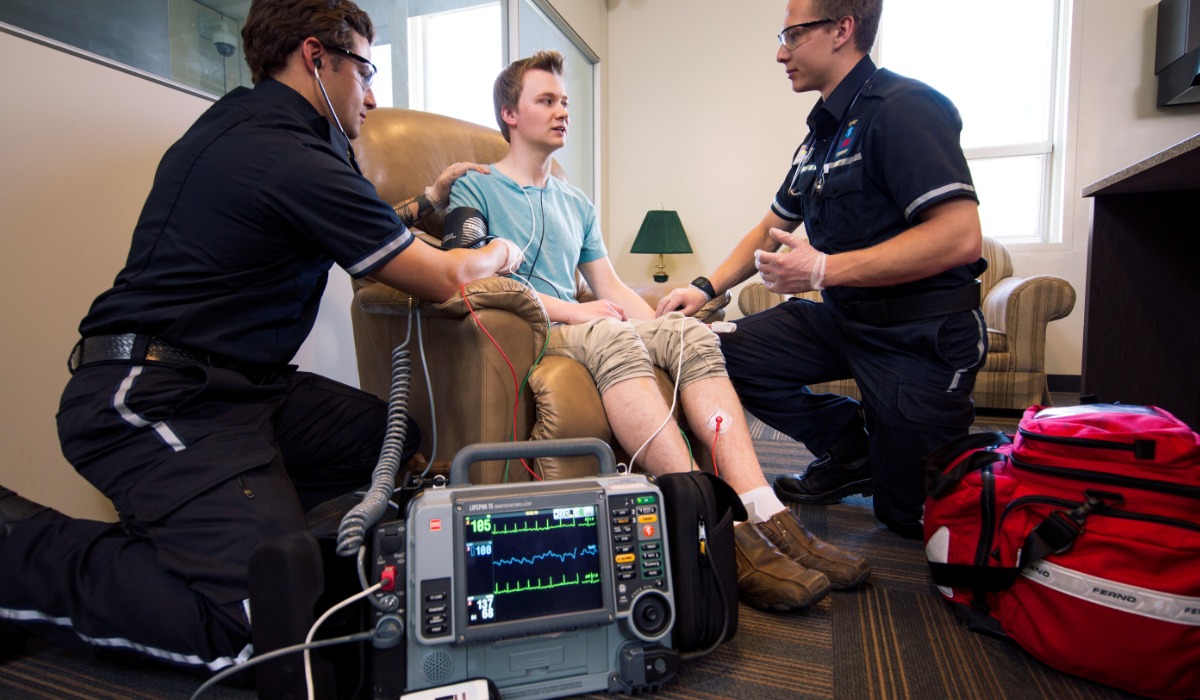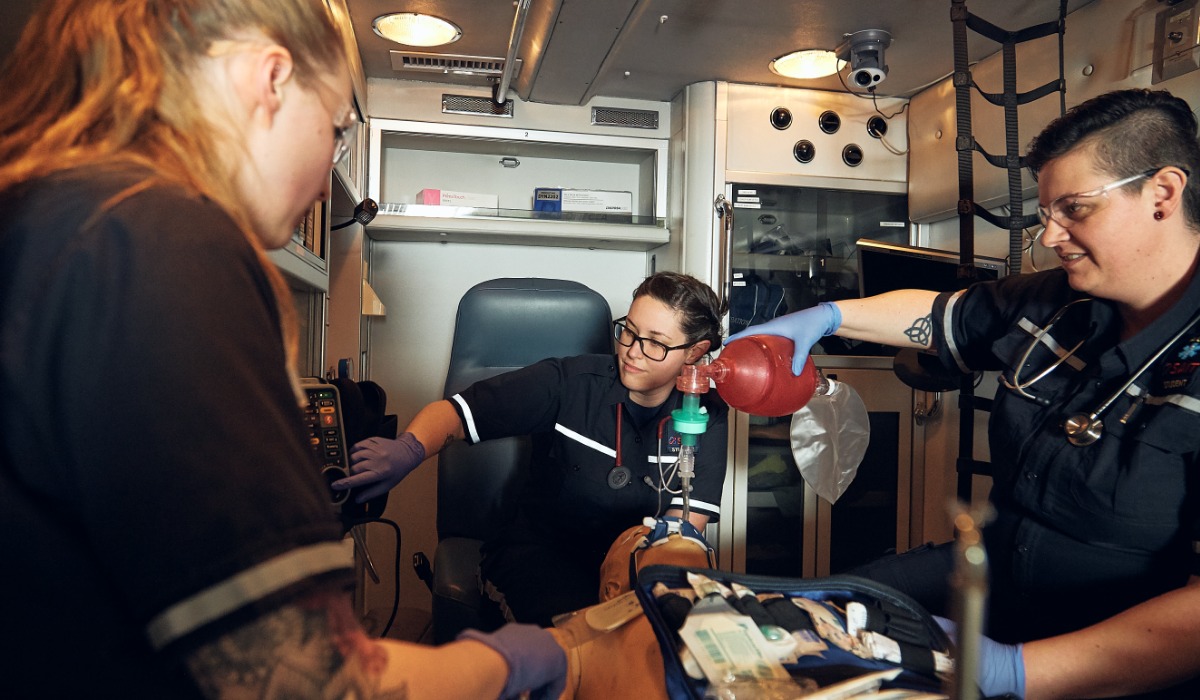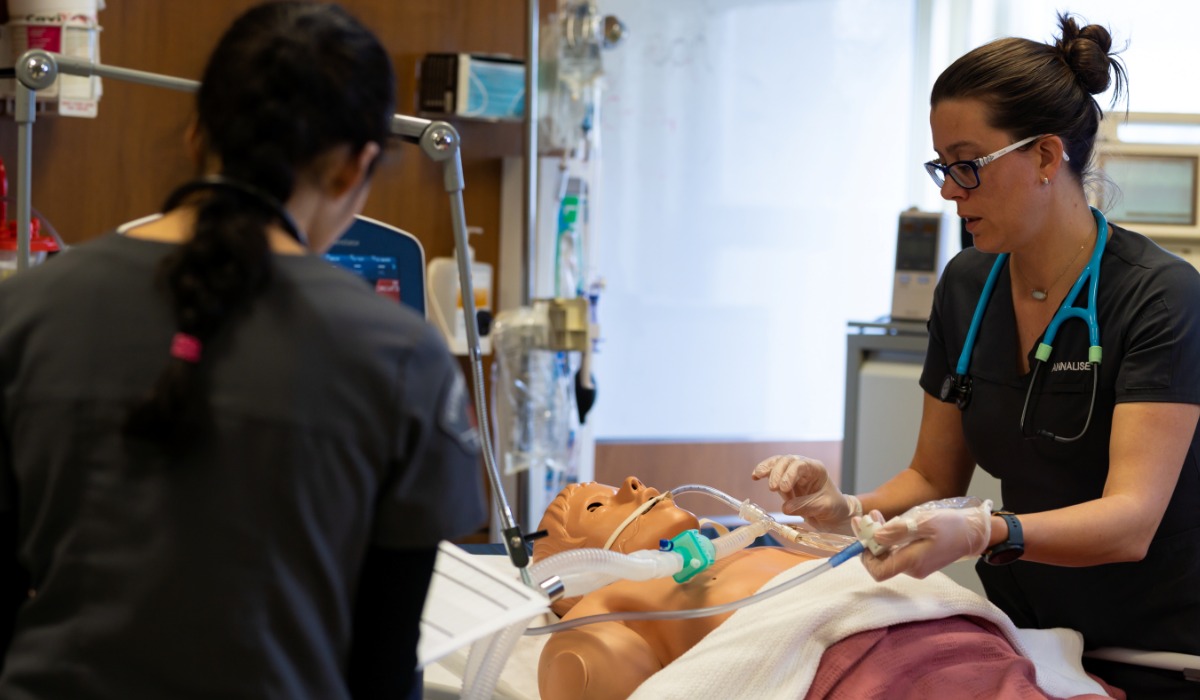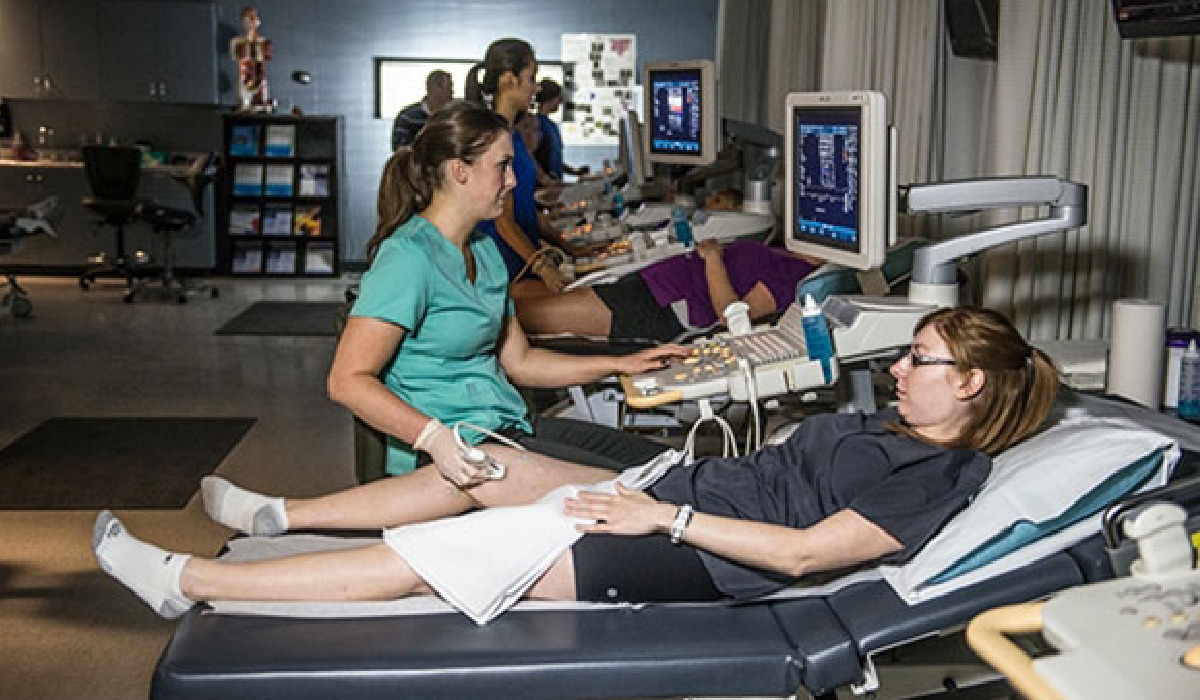Mandatory requirements
Applicants for this program are required to successfully complete the Emergency Medical Responder course as a mandatory admission requirement for this program.
Applicants are also required to complete the School of Health and Public Safety entrance testing process as an admission requirement for this program by the set deadlines.
Review admission requirements for more details.
Overview
Our immersive Primary Care Paramedic program is for those seeking to establish a career in pre-hospital emergency care.
Under the guidance of seasoned professionals, this program provides a comprehensive curriculum that equips you with the skills needed to become an integral member of a multidisciplinary healthcare team.
As a student, you will:
- acquire a thorough understanding of pre-hospital emergency care
- learn to perform detailed patient evaluations
- learn to interpret various diagnostic tools
- develop the skills to perform critical interventions and treatments
- become proficient in Basic Life Support (BLS), Advanced Life Support (ALS) and International Trauma Life Support (ITLS)
- participate in simulations in our state-of-the-art Centre for Advanced Patient Care Simulation and Advanced Ambulance Simulation labs
- obtain real-world experience in hospital, urgent care and ambulance settings under the mentorship of experienced preceptors
- focus on developing the competencies required for effective emergency response and patient care.
As a graduate, you will have the confidence and qualifications to respond to a wide range of medical emergencies as a first responder, providing high-quality patient care in dynamic and challenging environments.
Prepare for a fulfilling career as a Primary Care Paramedic and help meet the demands of modern emergency medical services.
Paramedics tend to be innovative, methodical and objective.
You need:
- a strong desire to help those in need
- effective communication skills
- leadership skills
- sound decision-making and critical-thinking skills
- adaptability
- the ability to work well under stress, maintain professional behaviour and regulate your emotions
- fine motor skills to provide advanced pre-hospital emergency care
- the ability to remain firm, reassuring and efficient in moments of crisis
- the ability to meet the physical demands of the job, including transporting, lifting and positioning patients and equipment
- the ability to work alone and on a team.
All emergency medical personnel should be comfortable assessing injuries and illnesses, performing patient care procedures which may be sensitive, and wearing personal protective equipment (PPE) for extended periods. This includes exposure to latex and other disinfectant materials.
Paramedics work extended hours and shift work, including nights and weekends.
You are strongly encouraged to refer to the ALIS website for career, learning, and employment information for emergency medical personnel, the Paramedicine National Occupational Competency Profile and Alberta Health Service's F.A.R.E. Paramedic requirements to ensure you can successfully meet the occupational requirements for the program and profession.
Graduates of this program meet the admission requirements for SAIT's Advanced Care Paramedic program.
You'll participate in required practicums under the guidance of experienced, on-site practitioners (preceptors) and SAIT instructors, who will mentor and oversee you in clinical settings.
You will be assigned practicum placements with consideration given to your preference of location. However, due to limited availability in Calgary, you might need to travel or relocate outside of the city or province.
The healthcare field has a strong focus on health, wellness, and fitness to practice due to the demanding nature of the work and Occupational Health and Safety requirements. As such, special considerations will not be granted based on individual circumstances or preferences, except those stated as protected grounds when an accommodation has been approved.
If you cannot obtain a tight facial seal while wearing a respiratory mask due to the presence of facial hair and refuse to shave for religious reasons, you will be considered unfit to work as a paramedic by Alberta Health Services (AHS) standards and will not be allowed to participate in practicum or successfully complete the program. Respiratory mask-fit testing is a requirement ahead of participating in your practicum.
In compliance with the practica agreements with our clinical partners, you will be required to provide specific documentation before you can participate in your practicum. Find out what requirements you need for this program.
Our Primary Care Paramedic program is accredited by Accreditation Canada at the Primary Care Paramedic level and meets the Alberta College of Paramedics core competency requirements.
Graduates are eligible to write the Canadian Organization of Paramedic Regulators registry exam and are required to register with the Alberta College of Paramedics to work in Alberta.
This program is recognized as qualifying for subsidized education by the Canadian Armed Forces for the Medical Technician occupation.
Upon successful completion of this program, you will be awarded a SAIT Primary Care Paramedic certificate.
Careers and opportunities
Each year, SAIT conducts a survey between February and April to determine the employment rate, salary and satisfaction of our newest SAIT alumni.
![]() 86% graduate employment rate
86% graduate employment rate
![]() $60,000 average starting salary
$60,000 average starting salary
Find out more about our graduate employment statistics >
Our graduates may work in the following occupations. Some careers require additional experience and education.
Associated National Occupational Classification (NOC) codes: 32102, 30010, 41404.
Career planning support
Unsure which career path is for you? Here are some recommended career planning resources to help you decide your future.
You can also head to Alberta alis for lots of information about careers in Alberta, including quizzes and labour market information to help you narrow down a path.
Finally, you can take our online career finder quiz, which can help narrow your options based on your current skills and interests.
Courses
The Primary Care Paramedic certificate requires 34.5 credits (15 courses) to complete.
The program spans 40 weeks over three semesters. Depending on practicum site availability, PRAC 252 may continue beyond the third semester.
The program's Fall semester intake is primarily delivered on campus, while the Winter semester intake is blended, with theory courses completed primarily online, and labs on campus. Both delivery methods offer the same curriculum, and require full-time study.
| Course | Credits |
|---|---|
|
Physiology and Physical Assessment embraces an integrated approach to the study of body systems with a focus on both anatomy and physiology. Key components of this approach include gathering a patent's history, developing interview strategies and learning how to conduct a comprehensive physical examination. |
1.5 |
|
Basic Pharmacology focuses on the theory and practice of safe medication administration. Topics include Canadian drug legislation, scope of practice guidelines specific to Alberta and an emphasis on experiential learning in the lab environment. |
1.5 |
|
Traumatic Emergencies will focus on the pathology, assessment and management of various types of traumatic emergencies and injuries. Topics include burns, trauma to the head, spine, chest, abdomen and extremities. Geriatric, pediatric, obstetrical trauma patients will also be studied. International Trauma Life Support (ITLS) Basic certification will be awarded upon completion of this course. Pre-requisites:
|
3 |
|
Community Integration is a unique experiential opportunity that puts theory into practice by implementing communication and history-gathering strategies as well as components of the physical exam. Emphasis is placed on interpersonal communication skills and the ability to demonstrate professionalism and leadership skills at all times. |
1.5 |
|
Respiratory Emergencies will focus on the pathology, assessment and management of common respiratory illnesses and diseases. Basic respiratory pharmacology and therapies will also be studied. |
3 |
|
PCP Lab 1 focuses on the integration of knowledge and skills learned during the first semester of the Primary Care Paramedic program. Interpersonal communication skills and the ability to demonstrate professionalism and leadership skills at all times will be practiced in simulated scenarios. |
3 |
|
Professional Practice 1 examines legislation governing the practice of Primary Care Paramedics (PCPs) in Alberta. Topics include professionalism, workplace leadership and communications, documentation and verbal reporting specific to emergency medical services and an introduction to research methodologies. Current legal and ethical issues will also be examined. |
1.5 |
|
Medical Emergencies focuses on the pathology, pathophysiology, assessment and management of medical emergencies related to toxicology, anaphylaxis and allergic reactions, gastrointestinal - genitourinary (GI-GU), environmental situations, infectious diseases and altered levels of consciousness. Performance assessments will be conducted to evaluate the integration of skills. Pre-requisites:
|
3 |
|
Special Populations focuses on the pathology, pathophysiology, assessment and management of medical emergencies related to obstetrics and gynaecology, neonates and paediatrics, geriatrics, mental health, psychological and behavioural issues, and physical challenges. Performance assessments will be conducted to evaluate the integration of skills. Pre-requisites:
|
3 |
|
Cardiac Emergencies focuses on the pathology, assessment and management of common cardiac emergencies. Basic cardiac therapies and diagnostics, including pharmacology and electrocardiogram (ECG) monitoring are explored and implemented in the simulated and non-simulated patient environment. |
3 |
|
Professional Practice 2 prepares students for the transition from the classroom to the practicum environment. Areas of professional responsibilities which will be focused on include: WHMIS, vehicle stabilization and patient extrication. The professional registration examination process will be reviewed. Pre-requisites:
|
1.5 |
|
PCP Lab 2 builds upon knowledge and skills covered in Primary Care Paramedic (PCP) Lab 1. Emphasis will be placed on pathophysiology covered, and skills attained during the second semester of the program. Interpersonal communication skills and the ability to demonstrate professionalism and leadership skills at all times will be practiced in simulated scenarios. Pre-requisites:
|
3 |
|
Fitness and Wellness promotes physical fitness, mental health, nutrition and safe workplace strategies. Critical Incident Stress Management (CISM) is also explored as a tool to help students develop a stress management plan to prepare themselves for the strenuous demands of the profession. Pre-requisites:
|
1.5 |
|
Clinical Practicum provides a hands-on opportunity to exercise comprehension of course materials and demonstrate skills acquisition while following procedural practice in a clinical setting. Expert guidance and evaluations are provided throughout the practicum by an on-site preceptor and a SAIT instructor. Pre-requisites:
|
1.5 |
|
Ambulance Practicum provides a hands-on opportunity for learners to apply theory and practical skills in a pre-hospital setting. Expert guidance will be provided throughout the practicum by an on-site preceptor and SAIT instructor. Pre-requisites:
|
3 |
Progression
You must attain a PGPA and/or a CGPA of 2.0 or better each semester and pass the prerequisite courses to progress through the program.
To qualify for graduation, you must pass all courses, attain a CGPA of 2.0 or better and complete course requirements within the prescribed timelines.
Admission requirements
Applicants educated in Canada
All applicants must demonstrate English language proficiency and meet the following requirements or equivalents:
- at least 50% in Math 20-1 or 20-2, and
- at least 50% in English Language Arts 30-1 or 30-2, and
- at least 50% in Biology 30 or Science 30
- SAIT's ANPH 209 course is accepted in-lieu if the Biology 30 or Science 30 requirement, and is available to complete though SAIT's Open Studies program
You also must achieve a mark of at least 50% in the School of Health and Public Safety's Entrance testing process.
You must also prove you have completed an Emergency Medical Responder (EMR) certificate or a medical sciences-related diploma, degree, or equivalent.
The following qualifications are recognized as equivalent to the Emergency Medical Responder (EMR) certificate or medical sciences-related diploma or degree:
- Licensed Practical Nurse (LPN) with at least one year of experience
- Medical First Responder (MFR) or First Medical Responder (FMR) with International Trauma Life Support (ITLS) provider certification
- Registered Nurse (RN) with at least one year of experience
- Licensed Physician with at least one year of experience
Applicants must be at least 18 years old as of the commencement of the program's second semester.
SAIT accepts high school course equivalents for admission for applicants educated outside Alberta.
All applicants who were educated outside of Canada must demonstrate English language proficiency and provide proof they meet the program admission requirements outlined above with an international document assessment. Find accepted educational documents and assessment options.
SAIT may also accept courses completed at certain international post-secondary institutions.
Academic Upgrading
Missing an admission requirement for this program? Upgrade your prior education to help you receive admission into one of SAIT's career programs.
English language proficiency
All applicants must demonstrate English language proficiency prior to admission, including students educated in Canada.
Transfer agreements
At SAIT, we have created transfer agreements with partner institutions to allow you to earn course credits toward your SAIT program based on your previously completed credentials.
Transfer Alberta search tool
Use the Transfer Alberta search tool to see all transfer agreements between Alberta post-secondary institutions (including those with the University of Calgary, Mount Royal University and Bow Valley College.)
Search transfer agreements in Alberta
Transfer options for graduates
When you have completed this program, you may continue your education at a partner post-secondary institution. These transfer agreements include partnerships within and/or outside of Canada.
Credits this program transfers to
- Available credits:
- n/a
If you are considering a future career with the Canadian Armed Forces (CAF), you can apply for their paid education program
Once you are an accepted non-commissioned member (NCM) in the CAF, you'll have all your tuition, books, and academic equipment covered while receiving a salary with benefits. Upon your graduation, you'll be eligible to work for CAF as a Medical Technician.
Available intakes
Fall 2026
Start dates:
- Domestic students: Open
-
-
Application deadline: March 31, 2026
-
- International students: Open
-
-
Application deadline: May 29, 2026
-
Costs
2025/26 tuition and fees
The following estimated costs are effective as of July 1, 2025.
The estimated total cost of tuition and fees is based on the suggested schedule of study. Following a modified schedule will impact the fees you pay per semester and may alter final costs.
Domestic students
*.5 indicates a combination of full-time semester(s) and part-time semester(s) in the same academic year. In many cases, students are completing a practicum during their part-time semester. Part-time students are those taking less than nine (9) course credits in a semester. You are not eligible for the UPass during a part-time semester.
The program total is based on the estimated amount you will pay if you enter this program during the 2025/26 academic year. The program total amount listed on your letter of admission may appear higher. This amount is your maximum tuition guarantee for the program. SAIT will not exceed this maximum, regardless of changes in tuition and fees between academic years.
*.5 indicates a combination of full-time semester(s) and part-time semester(s) in the same academic year. In many cases, students are completing a practicum during their part-time semester. Part-time students are those taking less than nine (9) course credits in a semester. You are not eligible for the UPass during a part-time semester.
Books and supplies are approximately $4,000 for the duration of the program.
This is a bring-your-own-device program with a standard computer hardware and software requirement. See the specific requirements on our computers and laptops page. An Apple tablet is recommended, as it is required to support certain applications used in the program, and will support all portable computing device requirements of the program.
Find your booklist on the SAIT Bookstore's website. Booklists are by semester and made available approximately two weeks before classes begin.
Required personal protective equipment (PPE) and uniform
Uniforms and PPE are to be purchased before orientation day.
Print and take the uniform order form to Trademark Workwear Inc. to order your SAIT uniform. Ensure you order your uniform early.
CSA-approved safety glasses and black steel-toed duty boots may be purchased where available.
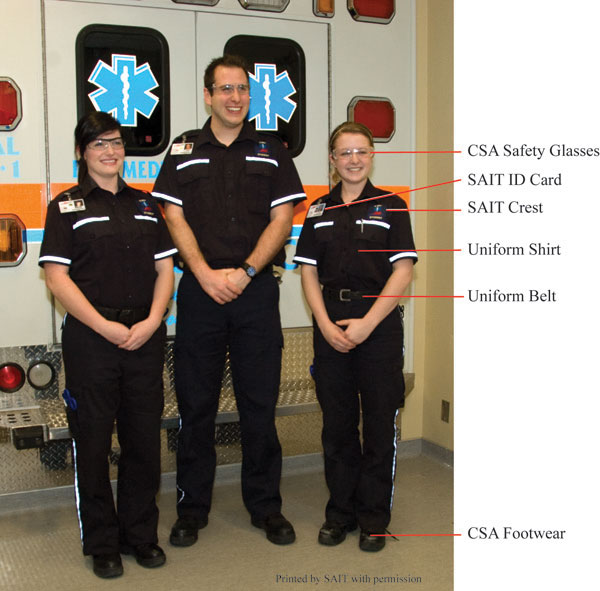
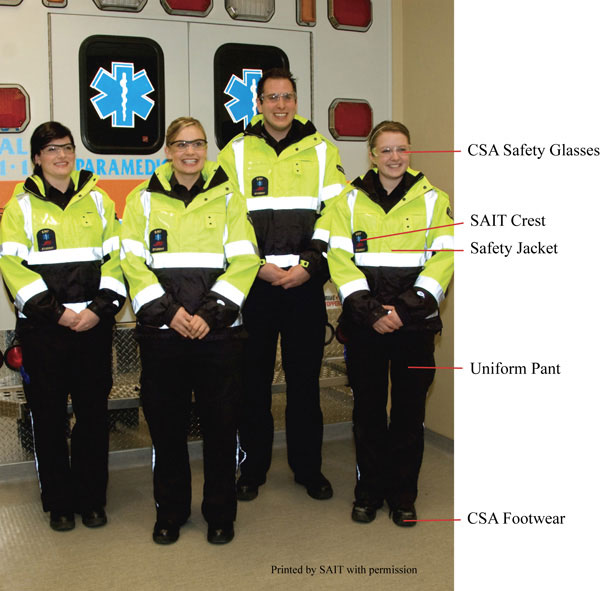
Ballistic vests
The SAIT paramedic programs do not require ballistic vests.
Many practitioners can be issued a ballistic vest by their employer as PPE. This is an employee's decision if they want the ballistic vest or not.
As a best practice for scene safety, police deem the situation safe before EMS crews enter, and our students are not first in any situation where this type of PPE is required.
If you wish to purchase your own ballistic vest for use on practicum, you can do so through the AHS-approved vendor Urban Tactical, Winnipeg, which has the required minimum specifications for a ballistic vest.
If you decide to purchase and wear the vest, you must ensure that your SAIT crest and student identification are clearly visible on the vest without compromising its integrity.
If you have a ballistic vest from an employer, you are not allowed to wear that employer's issue as part of the SAIT uniform.
If you choose to wear a ballistic vest during your program, you must purchase a personal ballistic vest.
Ballistic vests are personally fitted, have a limited lifespan, and are not resalable as they do not provide the appropriate protection second-hand. If you choose to wear a personal ballistic vest, you must wear it for every call during your practicum rotations.
Additional fees
- A fee of $75 per semester is associated with the CompTracker application used in this program.
- A fee is associated with obtaining a police information check, including a vulnerable sector check, payable to the police or the Royal Canadian Mounted Police (RCMP).
- You must have your immunizations reviewed by the SAIT Health Clinic. There is a $75 charge to review vaccine history. Any vaccines you need to be administered will result in additional charges.
- A fee of approximately $50 to $100 is associated with an electronic student permit checking submission, which is required for clinical practicum placements, payable to Synergy Gateway through the Verified software platform.
- You are responsible for additional expenses related to your practicum, including pre-practicum requirements and relocation costs to practicum sites outside of Calgary.
- There is a fee for the Alberta College of Paramedics (ACP) provincial exam and a registration fee of $475. Annual renewal fees are approximately $425.
- A Class 4 Driver's license may be required for employment. We recommend you review the Alberta government information for requirements and begin the process while in the program.
Financial aid
Paying for your education may feel overwhelming, but we have resources and programs that can help, including information about payment options, student loans, grants and scholarships.
Application process
Ready to apply?
Follow our step-by-step guide to submitting a successful application.
Communication during admission
Email is the primary source of communication during the admission process. Ensure your personal email account is managed appropriately to receive our emails, files and communications.
We recommend you add hps.info@sait.ca domain to your safe senders' list or you risk missing critical email messages.
Begin your application
Apply now using the online application portal.
Ensure you have a valid Visa or Mastercard to pay the non-refundable application fee of $120 for domestic applicants.
Information sessions
Prepare for a strong start in your chosen program or get the details you need to decide your future path.
Our expert staff and faculty are ready to answer your questions and provide information about the following:
- What sets SAIT apart
- An introduction to the program and area of study
- Admission requirements
- Future career paths
- Information on the earning potential and graduate employment rates.
Contact us
School of Health and Public Safety Advising
-
Email - hps.info@sait.ca
International Student Advising
-
Phone - 403.284.8852
-
Email - international@sait.ca
Subscribe for updates
Your journey starts here! Sign up to get important updates on:
- Health and medical programs
- Application information
- Relevant news and events

Oki, Âba wathtech, Danit'ada, Tawnshi, Hello.
SAIT is located on the traditional territories of the Niitsitapi (Blackfoot) and the people of Treaty 7 which includes the Siksika, the Piikani, the Kainai, the Tsuut’ina and the Îyârhe Nakoda of Bearspaw, Chiniki and Goodstoney.
We are situated in an area the Blackfoot tribes traditionally called Moh’kinsstis, where the Bow River meets the Elbow River. We now call it the city of Calgary, which is also home to the Métis Nation of Alberta.
